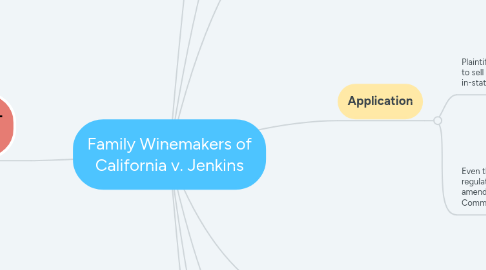
1. Derrik L Karst - Business Law - Section 34
2. Facts
2.1. Parties
2.1.1. Plaintiffs
2.1.1.1. Family Winemakers of California
2.1.2. Defendant
2.1.2.1. Eddie J. Jenkins = Chair of the Alcoholic Beverages Control Commission of Massachusetts
2.2. What happened
2.2.1. In 2006, Massachusetts legislature passed a law distinguishing between "small" and "large" wine producers.
2.2.1.1. Small: producing less than 30,000 gallons
2.2.1.1.1. Could choose to sell through wholesale-retail AND direct-to-consumer channels
2.2.1.2. Large: producing more than 30,000 gallons
2.2.1.2.1. Could choose to sell through ONLY ONE channel: wholesale-retail OR direct shipping to consumers
2.2.2. All of Massachusetts' wineries qualified as "small" producers, and all "large" producers of wine were located outside of Massachusetts. These large producers account for 98% of wine in U.S.
2.2.2.1. Small wineries received preferential treatment by accessing more channels/markets.
2.2.3. Prior: An earlier law stating only in-state wineries could ship directly to consumers had been invalidated.
2.3. Procedural history
2.3.1. The plaintiff argued that different treatment of in-state and out-of-state wineries qualified as discrimination under the Commerce Clause
2.3.2. The federal district court agreed and enjoined the law
2.3.3. Defendant appealed to the US Court of Appeals
3. Issue
3.1. Whether Massachusetts' law violates the Commerece Clause by giving preferential treatment to in-state business interests while disfavoring out-of-state firms.
4. Rule of Law
4.1. Negative/dormant Commerce Clause & discrimination
4.1.1. Supreme Court: federal government has the exclusive authority to regulate interstate commerce
4.1.1.1. States DO NOT have authority to regulate commerce between states
4.1.2. Test: "Whether [the law] regulates evenhandedly with only 'incidental' effects on interstate commerce, or discriminates against interstate commerce." Hughes, supra, 441 U.S., at 336, 99 S.Ct., at 1736.
4.1.2.1. "'Discrimination' simply means differential treatment of in-state and out-of-state economic interests that benefits the former and burdens the latter.” Oregon Waste Systems, Inc. v. Department of Environmental Quality of Ore., 511 U. S. 93
4.2. 21st Amendment
4.2.1. States can regulate sale of alcohol within their borders
5. Application
5.1. Plaintiffs are burdened by not being able to sell their wines in the same way as an in-state producer
5.1.1. Facts: All "large" wineries exist outside of Massachusetts. Further, "large" wineries produce 98% of U.S. wine.
5.1.1.1. Therefore, law discriminates against "large" out-of-state wineries for the benefit of "small" in-state wineries.
5.1.1.2. These effects are not merely "incidental".
5.1.2. History of foreign-state discrimination
5.1.2.1. Fact: Before 2005, only in-state wineries allowed to ship directly to consumers.
5.1.2.1.1. This law was held to be invalid under the Commerce Clause.
5.1.2.1.2. This, along with legislators' statements, show that the 2006 law was intentioned to give an advantage to "small" in-state wine producers
5.2. Even though Massachusetts has right to regulate alcohol sales under 21st amendment, regulations cannot contradict Commerce Clause
6. Conclusion
6.1. Law affects interstate commerce
6.1.1. Because all Massachusetts wineries benefit while "large" out-of-state wineries do not, the law does not evenhandedly apply regulation to in-state and out-of state-firms.
6.1.1.1. Therefore, the law is discriminatory under the Commerce Clause.
6.1.1.1.1. Appellate court affirms district court's ruling
7. Impact
7.1. DIRECTV, LLC v. Commonwealth of Massachusetts
7.1.1. Plaintiff argued different taxation of satellite and cable TV providers is discriminatory under Commerce Clause
7.1.1.1. Court ruled that, unlike Family Winemakers of California v. Jenkins, that the taxation does not distinguish against in-state and out-of-state TV providers
7.1.1.1.1. Therefore, the taxation is not unconstitutional under Commerce Clause
7.2. American Bus Association, Inc. v. District of Columbia
7.2.1. Plaintiff argued that statue requiring trip permits or registration of out-of-state buses violates Commerce Clause
7.2.1.1. Court ruled that both in-state and out-of-state operators have same fees and same options to pay.
7.2.1.1.1. Therefore statue was not discriminatory under dormant Commerce Clause
8. Influence
8.1. Business practice: lobbying/petitioning
8.1.1. State legislators have an inherent duty to constituents and may be tempted to pass laws that favor in-state interests
8.1.2. Businesses cannot petition/lobby for laws that give them an advantage over their out-of-state competitors
8.2. Business practice: taxation
8.2.1. Taxes, like regulation, also should be applied evenhandedly
8.2.2. Many cases (i.e.: Coors Brewing Co. v. Mendez-Torres, DIRECTV, Inc. v. State, Dept. of Revenue)
8.2.3. Growing concern for states as more business is conducted between states (i.e.: e-commerce)
